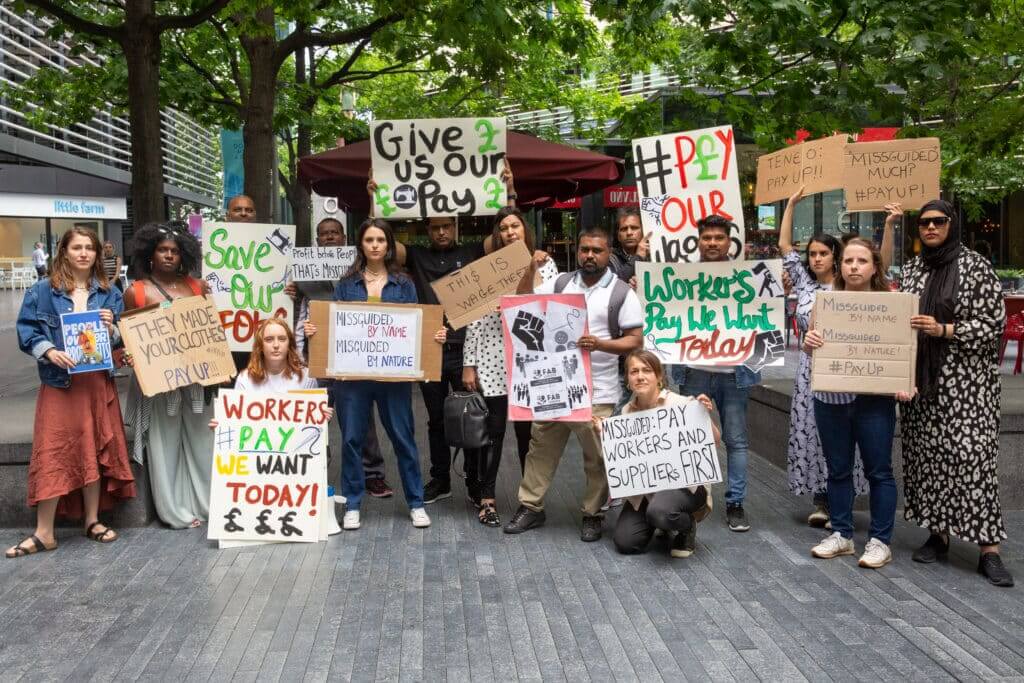Venetia La Manna is a campaigner and online content creator who recently took part in a disruptive action at a panel held by fast fashion brand Boohoo, to highlight the company’s unethical pay practices and working conditions. The video has had tens of thousands of views online and was covered by various media outlets – we caught up with her to find out more.
Wicked Leeks (WL): Your Boohoo action (to disrupt a panel on ethical fashion held by the company) was brilliant – how did it come about?
Venetia La Manna (VLM): The motivation behind it was to hold Boohoo to account. I don’t think any organisation should be holding a panel with only [people from] their business calling it a panel; that’s a presentation. The title of the panel was ‘the future of ethical fashion is collaboration’, and I just thought how can you be collaborative if you don’t pay your workers?
WL: What has the reception been like?
VLM: Overwhelmingly positive. The videos have had a lot of eyeballs on them on TikTok and Instagram, and lots of engagement, which is absolutely brilliant, as that’s how the action can live on.
WL: Have you had any reaction from Boohoo?
VLM: I’m not really looking for dialogue with Boohoo, because I don’t trust them. I genuinely don’t trust that there’s any foundation to what they’ve got to say. If Boohoo was genuinely committed to creating long-lasting change, their current business model as we know it would cease to exist. Because if they started paying people a fair living wage, they wouldn’t be able to sell as many products at the price point at which they are.
WL: What’s your motivation?
VLM: My motivation is how can I use my position of privilege to be in solidarity with the people who make their [Boohoo’s] clothes? Because they don’t have the privilege to be able to jump on stage at 11am on a Tuesday to call Boohoo out without risking their jobs and risking their livelihoods. And how can I get this message out to as many people as possible and hold, in my opinion, one of the UK’s most unethical brands to account so that they can’t get away with their unethical practices and greenwashing?
WL: Was it scary? The security guards were massive and quite forceful.
VLM: I nearly backed out of it a couple of minutes before because I was approached by a couple of high up people, who assumed why I was there and tried to intimidate me a little bit. But fortunately, that is the power of organising with others – I was very much there with a group of other women, who were as part of it as I was, and because of them I prevailed. But yes, it was nerve-wracking.
WL: I imagine it was quite uncomfortable for them.
VLM: For me, what was so uncomfortable was watching the video back and seeing them smirking in the background. This is a brand that prides itself on female empowerment. And they can sit back and watch however many women be treated in that way and smirk.
WL: When did you first became aware of the issues in fashion?
VLM: I was actually called out online, or ‘called in’, on my YouTube channel. Someone said ‘hey, cool that you’re plant-based, but you’re wearing fast fashion. This doesn’t really align; please can you go and educate yourself on this.’ And that was about five years ago. It’s interesting that people say you can’t be shamed into positive change but for me it was a real catalyst.
WL: How much are mega influencers to blame for putting their name to fast fashion brands and legitimising their green claims?
VLM: We cannot underestimate the power of influencers, especially privileged influencers who fly in private jets and have millions of followers. We cannot underestimate just how powerful they are, not only pushing us into buying more things that we don’t need, but also their contribution to how society views a topic. I really do believe that the more privilege you have, the more discerning you have to be about the kind of projects or brands you partner with. There is a certain calibre of influencers, so the Kourtney Kardashians and the Molly-Maes of the world, who I really do think need to be held to account for the decisions that they make.

WL: What else happened in this panel?
VLM: Boohoo said the reason we partnered with Kourtney Kardashian was because we did a survey with our customers, and when it comes to sustainability, they all said ‘we are really confused’. The reason that is so frustrating is that it’s because of brands like Boohoo that people find sustainability so confusing. Because everything they are saying isn’t true. You can’t have a brand that is that unethical talking about sustainability, it’s just greenwash.
WL: Can you give me an example?
VLM: You can’t have a sustainable brand, in my opinion, unless the people who are part of creating its products are treated fairly, paid a fair living wage and have a safe place to work. In August 2020, there was an investigation by The Times that unearthed that Boohoo workers are being paid £3.50 an hour, and this is just the tip of the iceberg. It’s part of a much bigger picture of how poorly they treat the people who make their clothes. It’s also a question of scale – Boohoo produces something like 207 million items of clothing a year. You can’t even say you’re working towards sustainability by using recycled materials if you’re producing that many clothes.
WL: You can’t tinker round the edge of the system without tackling the main problems?
VLM: 100 per cent. I’ve got friends in Ghana, who work in the largest second-hand clothes market in the world, and they’re not reading the label and saying ‘oh but it’s made from 50 per cent recycled organic cotton’. Yes it’s important, but if we’re not addressing fair living wages and we’re not addressing scale, it doesn’t really matter what percentage of recycled material we have.
WL: Would you call yourself an activist?
VLM: I feel funny about the word. I feel like it’s a word that carries a lot of weight. It’s a part of what I do, but I see the activists in the fashion space as garment makers and their unions who are organising the better wages, and better, safer workplaces, who are literally doing the work seven days a week.
WL: Have you faced much negativity online? People do seem to pick out people trying to be green and try and catch them out in some way.
VLM: I just block [it] out because I think it’s irrelevant. It’s the same with the Just Stop Oil protests, and ‘how dare these privileged white people do this?’ Say whatever you want to say – you’re just derailing the situation and you’re also drawing us apart when we need to be coming together. And also, it’s a very clever tool used by the media telling normal people that if you do this, you’ll be called out publicly for driving a car, or whatever it is. It’s a tool used to put us off taking action, and that is so harmful. So I try and just ignore it.
WL: What’s the best way to reduce the impact of our clothing?
VLM: My tip for sustainable fashion if you’re new to it, is to really know that the most sustainable clothes are the ones you already own. You don’t need to go and buy new clothes to be part of this movement, and in fact that’s the last thing you should do. My number one piece of advice is to organise your wardrobe, so you can see what you have and wear more of it. And then things like reading books, watching documentaries, hosting swap shops with your colleagues; these are all really great ways to be involved that don’t involve buying.












Excellent article, from one who buys everything from a charity shop. I hate everything about fashion, completely manmade, pure marketing, as are diamonds, Champagne and Halloween. And sadly people are so gullible. In fact, that’s another topic worth investigating, why the gullibility when we know what the truth is……..
Thank you, that’s great to hear. We are big charity shop fans too. Hopefully activism like Venetia is doing will bring awareness of this to wider audiences.